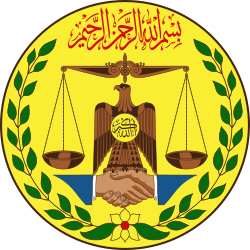| ||||||||||||||||
315 electors 158 votes needed to win | ||||||||||||||||
|---|---|---|---|---|---|---|---|---|---|---|---|---|---|---|---|---|
| ||||||||||||||||
| ||||||||||||||||
 |
|---|
Presidential elections were held in Somaliland on 23 February 1997, the third indirect presidential election since the country declared its independence from Somalia in 1991. The elections took place towards the end of the Hargeisa Conference, held between October 1996 and February 1997. [1] The election resulted in incumbent President Muhammad Haji Ibrahim Egal being reelected to a four-year term by an electoral college of elders who made up the national guurti(council of elders). [2] Egal's closest competitor was Minister of Finance Suleiman Mohamoud Adan, who was also formerly in the cabinet of inaugural President Abdirahman Ahmed Ali Tuur. [3]


